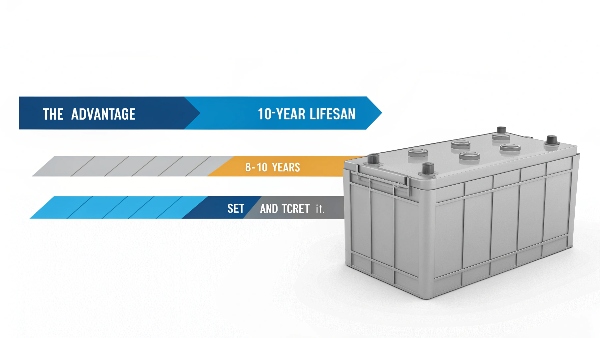Power outages threaten your critical systems. Old batteries fail unexpectedly. A Lithium-ion UPS offers a reliable, modern solution to protect your operations and data.
A Lithium-ion UPS battery backup uses advanced LiFePO4 chemistry and a smart Battery Management System (BMS). It provides longer-lasting, lighter, and more reliable power than lead-acid, ensuring your critical equipment stays online during an outage with superior performance.

Transition Paragraph:
I've been in the UPS manufacturing business for over ten years here at Daopulse. In that time, I've seen a huge shift. We used to just sell "backup power." Now, clients like Mr. Li, a procurement manager for a large hospital system, ask for "power certainty." He can't afford to have a single doubt about the systems protecting life-saving equipment. That's why the conversation now centers on advanced solutions like Lithium-ion. Let's explain how this technology provides that certainty.
How Long Do Lithium-Ion UPS Batteries Truly Last?
Tired of replacing UPS batteries every few years? The constant cycle of purchasing, scheduling, and installation creates downtime and unpredictable costs. There is a much better way.
A high-quality lithium-ion (LiFePO4) UPS battery lasts 8 to 10 years under normal operating conditions. This is more than double the 3-5 year lifespan of a standard lead-acid battery, drastically reducing replacement frequency and long-term costs.

Dive deeper Paragraph:
The 8-to-10-year lifespan isn't just a best-case scenario; it's a result of superior engineering. It comes down to two key factors: chemistry and intelligence. The Lithium Iron Phosphate (LiFePO4) chemistry we use is incredibly durable. It can handle over 2,000 full charge-and-discharge cycles. A typical lead-acid battery can only handle 300-500 cycles before it degrades significantly. The second factor is the built-in intelligence, the Battery Management System (BMS). This small computer inside the battery pack constantly balances the cells and protects them from overcharging or draining too deeply. Lead-acid has no such protection. This active management means the battery lasts longer and performs more reliably. For a system integrator, this means you can install a unit for a client and not worry about a service call for a battery replacement for a decade. It’s a true “set it and forget it” solution.
Is There a Difference Between a UPS and a Battery Backup?
You hear the terms used interchangeably. This causes confusion. Are you buying a simple power strip with a battery or a true system that protects your sensitive electronics?
The terms are often used for the same device. However, a "UPS" (Uninterruptible Power Supply) implies a more advanced system with power conditioning to protect against surges and sags, not just providing power during a complete outage.

Dive deeper Paragraph:
While people use the names interchangeably, there is a technical difference that matters for professionals. A basic "battery backup" is often a simple standby UPS. It lets dirty utility power pass right through to your equipment and only switches to the battery during a total blackout. A true Uninterruptible Power Supply, especially a line-interactive or online double-conversion model, does much more. It actively conditions the power. It acts as a buffer, smoothing out the small sags and swells in voltage that happen all day long. These small power events are invisible to us, but they slowly damage sensitive electronic components over time. For a data center, hospital, or bank, protecting multi-thousand-dollar servers from this damage is just as important as protecting them from a blackout. Using a true UPS with power conditioning extends the life of your critical equipment.
| Feature | Basic "Battery Backup" (Standby UPS) | True Uninterruptible Power Supply (UPS) |
|---|---|---|
| Primary Function | Power during blackouts only | Power conditioning + blackout protection |
| Power Quality | Passes utility power directly | Actively cleans sags, swells, noise |
| Transfer Time | Small delay (milliseconds) | Often zero (for Online models) |
| Best For | Desktop PCs, non-critical devices | Servers, medical gear, network racks |
Is the Higher Cost of a Lithium-Ion UPS Actually Worth It?
The sticker price of a lithium-ion UPS is higher. This makes you question the investment. But focusing only on the initial cost hides the bigger, more expensive picture.
Yes, they are absolutely worth it for critical applications. The higher initial price is offset by a much longer lifespan, zero maintenance, and better performance. This results in a significantly lower Total Cost of Ownership (TCO) over the unit's life.

Dive deeper Paragraph:
As an OEM manufacturer, I have this conversation about Total Cost of Ownership (TCO)1 every day. A procurement manager is responsible for the budget, so the initial price is important. But a smart procurement manager looks at the cost over the equipment's entire service life. A lead-acid UPS2 might seem cheaper, but you will pay for it multiple times. You pay for the replacement batteries in year 3 or 4. You pay for the technician's time to travel to the site and perform the swap. You carry the risk of downtime while the unit is being serviced. A lithium-ion UPS3 eliminates all of that. The TCO is just the purchase price. There are no battery replacements and no maintenance calls. Over 10 years, the lithium unit is almost always the cheaper, more reliable option. This predictability in both performance and budget is exactly what my clients value most.
What Are the Safety and Shipping Rules for UPS Lithium Batteries?
You hear "lithium" and think of strict shipping rules and safety concerns. This complexity can seem like a barrier, making you want to stick with the old, familiar technology.
UPS lithium batteries are classified for shipping and must follow specific regulations (like UN38.3). For safety, quality units use stable LiFePO4 chemistry and are certified to standards like CE and RoHS to ensure safe operation.

Dive deeper Paragraph:
Concerns about rules and safety are valid, and it's our job as the manufacturer to handle that complexity for our clients. First, let's talk about safety in operation. We exclusively use Lithium Iron Phosphate (LiFePO4), which is the most thermally stable and safest lithium-ion chemistry available. It is not prone to the issues seen in consumer electronics. All our units are also certified to meet CE and RoHS standards. Second, shipping. Yes, there are strict rules. The key one is the UN38.3 certification. This means the battery pack has been through a punishing series of tests for vibration, shock, altitude, and short circuits to prove it is safe for transport by air, sea, or land. As an experienced global OEM, we ensure all our products are fully certified and we provide all the necessary documentation. This means our clients, whether they are a brand or a system integrator, don't have to worry about it. They receive a safe, certified, and ready-to-deploy product.
Conclusion
A Lithium-ion UPS offers a longer life, lower total cost, and superior, worry-free performance. It's the modern, intelligent choice for protecting your most critical business systems.
-
Understanding TCO helps procurement managers make informed decisions that save money in the long run. Explore this link to learn more about its significance. ↩
-
Learn about the drawbacks of lead-acid UPS systems, including hidden costs and maintenance issues, to make better purchasing decisions. ↩
-
Discover the benefits of lithium-ion UPS, including cost savings and reliability, which can greatly impact your procurement strategy. ↩

